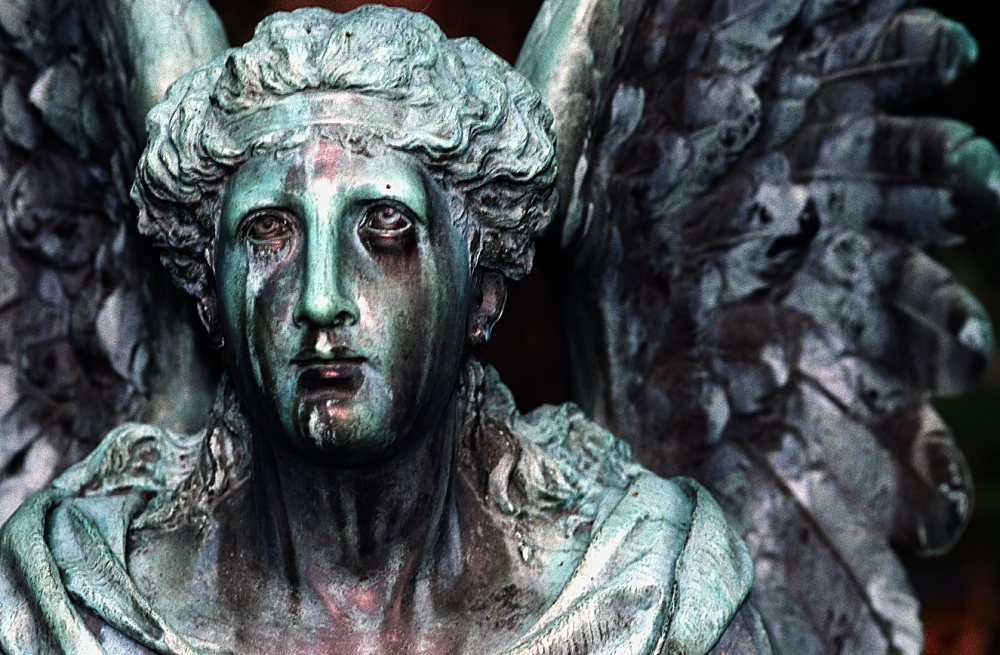It’s been very helpful to me as others describe their experience with a mid-faith crisis, and though I don’t expect to ever reach a large audience — both because I’ve deliberately limited my online presence in the last few years and because not many people go through this and fewer still are likely to care, I have appreciated those who took the time to write out their feelings. One of the things I have learned (to my surprise) is that prayer isn’t always the answer, and that it may be necessary NOT to pray for a period of time on your life’s journey, or you may need to learn a new practice like contemplative prayer to connect with God during or after a faith transition.
A year and a half ago I’d have told you there wasn’t a god. A year ago this month I told my husband I’d stopped believing in the Church as “the only true church”, that I had serious doubts about Jesus Christ, and I asked him to stop inviting me to be voice in our prayers with the family. I was willing to participate in our evening prayers, but I told him I absolutely would not pray aloud. He was shocked, which crushed me, if I’m being totally frank1. We have prayed together as a family for virtually all our married lives, and we have been so committed that we even call the kids who are out of state at school each evening to invite them to pray with us. It had been many months that I’d been passing on my part in the rotation more and more frequently, and by time I asked him not to ask me to pray again, I’d not prayed aloud with the family in some months.
By last September — almost exactly a year ago, I was far enough along in the faith transition pattern that I’d come to the conclusion there probably was a God/Creator, but I was still leaning more agnostic, and I had totally lost faith in Jesus Christ. Honestly, I was expecting to quit church all together once my daughter left home2, and I was counting down the days. Jared took it better than I thought he might, and he just let me be. His style has always been “ignore it and it’ll go away”, and I was relieved he didn’t try to meddle with me in some ways, but I was super disappointed he wasn’t aware of what I’d been enduring.
And enduring is the right word. The sure testimony I thought I had of God, Jesus Christ, Joseph Smith, the Restoration, and The Church of Jesus Christ of Latter-day Saints was in tatters after many months of struggle and study. I was approaching the “end” of the acute phase of what I call my faith-tastrophe3, and I finally had gotten back the strength to express aloud what had been so difficult to articulate, even to myself. I guess a person more knowledgeable in these issues would label what was happening a mid-faith crisis, coming as it did at midlife and during a time of personal transition. My acute phase lasted 6-8 months during which I felt I was literally in hell. Not that I believed in hell — just that it felt like being tortured from the inside out. I can’t express how agonizing it was. For months on end I felt raw, like my skin had been flayed off. It seemed as though the earth had moved somehow and everything was different but I’d stayed still, just an observer, seeing this strange world with my new eyes. It wasn’t depression (I know what that feels like) but it was what I later learned St John of the Cross calls the dark night of sense. I was cut off from God, not because of my “sinfulness” or the Mormon-preferred “unworthiness,” but because the Great I Am simply … wasn’t. He didn’t exist at all. Or if He did exist, He would not respond to me.
Pain when praying
One of the shocking, horrifying effects of the faith-tastrophe was I could no longer read scriptures or pray. These things had brought me so much joy and enlightenment in the past and so losing that solace was disturbing and disorienting. I’d try to pray and it would cause me pain, actual psychic pain, that felt so extreme that it felt physical, as if my body were under strain, racing every minute.
Now, if someone had told me two years ago that prayer would hurt me, I would not have believed them. I might have tried to listen sympathetically, but I’d have thought that someone who said prayer was painful was lying or experiencing guilt from trying to hide some sin. But I wasn’t. I reached out as I always had and got …. Nothing. It was actually less than nothing, for months on end. I’ve heard people say they have felt like they pray and it hits the ceiling, but I didn’t feel blocked. I felt void. Complete void. Nothing at all. God simply wasn’t there. I thought He may never have been, and even if He was, why wouldn’t he answer or help me?
Permission to stop praying
About a month after talking with Jared, I read something somewhere4 quoting St John of the Cross and his poem, The Dark Night of the Soul, and the book of the same title. It’s available for free online, and for the first time I realized what was happening to me was a known thing, that it had happened before and that there was an actual reason for the dark night of sense, although it frightened me5. Since, I’ve learned that this is something that many other people have suffered through in every faith system and that the symptoms and progression are remarkably similar6, but I’d never heard pain during prayer described in an LDS church service or text. In fact, virtually every bit of LDS wisdom on the topic says the opposite. Culturally and effectively, more prayer is The Answer to all LDS questions, and if it’s not working for you, you are the problem. Just ask Brigham Young, who said, “It matters not whether you feel like praying, when the time comes to pray, pray. If you don’t feel like it, pray until you do.”7
During this time I went to lunch with a friend, N, who was going through a similar experience, who told me she, too, was struggling to pray. Both of us are LDS, and we’d both independently given up prayer without ever being told it was okay to do. Prayer is so integral to lived Mormonism that stopping the practice feels akin to rejecting the faith all together. I related very closely to this article about a Muslim man who also experienced pain while praying. Islam is a faith that also includes a strong practice of prayer, and he, like me, felt conflicted as he became unable to pray during his spiritual crisis:
“No scholar or imam that I’ve explained my situation to has ever told me that I don’t have to pray,” he explained. They would insist that “ṣalāh is still wājib [obligatory].” While he knew intuitively that this expectation could not be correct, given how physically and psychologically damaging it was to him, he still couldn’t “help but feel guilty” and “alienated from Islam” as a result. He felt bound by the authority of this discourse, but couldn’t fulfill the standards and obligations presented as God’s will. His experiences thus left him with no clear framework about what it means to live out his commitment to Islam and God, leading him therefore to deep uncertainty and frustration. While it was not apparent to anyone, he was at the apex of a spiritual crisis.
The Crisis of Faith in American Islam: Between Personal Experience and Authority, by Zaid Adhami
Now, I’m fully aware that this is going to sound like abstract nonsense to someone who hasn’t been here. If this is you, bear with me. You are just going to have to trust that Nebil and I are not making this up. I don’t blame anyone for not understanding. Just a few years back, I would have read the words, but they would not have resonated with me as they do now. It’s okay. The journey of a faith crisis is dark and isolating. That’s why the following paragraphs from Dark Night brought so much relief to me. Someone understood! It was actually okay — a necessary part of the healing process even — not to pray when one is deep in the dark night:
BUT there is another thing here that afflicts and distresses the soul greatly, which is that, as this dark night has hindered its faculties and affections in this way, it is unable to raise its affection or its mind to God, neither can it pray to Him… And if it sometimes prays it does so with such lack of strength and of sweetness that it thinks that God neither hears it nor pays heed to it, as this Prophet likewise declares in the same passage, saying: ‘When I cry and entreat, He hath shut out my prayer.’
In truth this is no time for the soul to speak with God; it should rather put its mouth in the dust, as Jeremias says, so that perchance there may come to it some present hope, and it may endure its purgation with patience. It is God Who is passively working here in the soul; wherefore the soul can do nothing. Hence it can neither pray nor pay attention when it is present at the Divine offices, much less can it attend to other things and affairs which are temporal8. Not only so, but it has likewise such distractions and times of such profound forgetfulness of the memory that frequent periods pass by without its knowing what it has been doing or thinking, or what it is that it is doing or is going to do, neither can it pay attention, although it desire to do so, to anything that occupies it.
St John of the Cross, The Dark Night of the Soul, Book 2, Chapter 8
http://catholicsaints.mobi/ebooks/book-dnos/b02c08.htm
This was a big surprise to me, and as I said before, a relief — a relief so intense that I wept, knowing that this, here was finally someone who had been through what I was going through, who had helped others through it, and who knew what to do. It was necessary for healing for me not to pray for a period, according to St John of the Cross. I quit trying to pray, and I just let that practice go. That alone gave me more peace than anything I’d tried over the previous months combined. I didn’t have to fight anymore – I just needed to wait.
Why don’t LDS people talk about painful prayer?
I don’t know. Maybe it’s because in a church of certainty we must have all the answers, and prayer is the way we think we can get them. If prayer stops working, we can’t know anything, so we don’t even entertain the thought.
Struggling with God or faith is not unique to Mormonism or to me. But while we do a good job in the church inspiring people to behave righteously, we do a terrible job of helping people when righteous behavior is no longer enough — when prayer becomes painful and God is absent. With the exception of Thomas McConkie, I don’t know of any LDS person who has written systematically on this type of dark night or faith crisis in general and how it looks in Mormonism. He says that estimates show that only about 5% of studied populations are at this level of “ego-maturity”, which means that there are few of us, and what few of us there are feel isolated, especially within faith structures or institutions that are simply not equipped to handle the next step in faith development. St John of the Cross says those who enter into this dark night are “few” and “proficient9” in faith, who are able to live outward practices with joy and ease, but who are being called to purge their hearts and join in greater oneness with God.
It may be that Mormonism is simply just not a mature enough faith to have developed methods to describe and handle a dark night. To my frustration, I have found a lot more practical help with my faith struggles from non-LDS sources than sources within the faith, and I continue to. How grateful I am for those in other traditions that have shared their experiences, so that I feel a little less isolated.
The thing that happened
I wrote a few months ago when A Thing Happened that began my emergence from the dark night into light. What I learned is that something I call God is actually there, and that His love is radical, and that I want to be someone that can experience that love more frequently and offer that love to others, though I’ve come to find that my expectation of receiving it is far lower than before. I’ve always been one of those people who others turn to when they are struggling, but it’s happening more frequently now. I find myself far less concerned about persuading people to believe or behave the “right” way, and far more concerned about accompanying them on their journey, wherever it goes.
Why prayer is still hard
These days the pain is less acute, but I’m still struggling to pray. It doesn’t hurt any longer, but I struggle because I actually don’t know what to say when I try to pray, especially verbally. I struggle to know how to pray, as the Mormon patterns I used to follow (express gratitude, ask for what you need), no longer seem adequate to address the god I’ve met. I feel I can do things and I should. I feel like Epictetus:
[W]e say, “Lord God, let me not be distressed.” Moron, don’t you have hands? Didn’t God make them for you? So are you going to sit down and pray that your nose will stop running? Better to wipe your nose and stop praying. What, then — has he given you nothing to help with your situation? Hasn’t he given you endurance, hasn’t he given you greatness of spirit, hasn’t he given you courage?
Epictetus, Discourses 2.16.11–14
as quoted in The Practicing Stoic by Ward Farnsworth
I don’t know that I believe God gives endurance or greatness of spirit, but I do believe that humans have these things, and we should use them rather than wringing our hands waiting for some god somewhere to fix things for us. It seems better not to pray verbally at all than to ask for things I don’t believe will be influenced by my prayers anyway. I struggle when others ask for prayers on their behalf. Usually I pray as they request, but those prayers seem empty now. Even prayers asking for blessings on food seem silly to me now. I feel about prayer like this quote I found just today from Elder Pearson:
Prayer is not a negotiation process. It is an alignment process. We don’t move God to our point of view. Prayer is less about changing our circumstances and more about changing us. It is about seeking His will and asking for His help to do what we need to do. When we align our will with Heavenly Father’s will, answers and spiritual power will flow more freely. Following this pattern allows us to pray with faith.
Kevin W. Pearson, Improving Your Personal Prayers, from a devotional address given at Brigham Young University–Hawaii on May 17, 2011
https://www.churchofjesuschrist.org/study/ensign/2013/06/improving-your-personal-prayers?lang=eng
In other faiths, this alignment-seeking is known as contemplative prayer10. But in Mormonism, we’d not speak of contemplative prayer. In fact, a search of churchofjesuschrist.org finds only one use of the term contemplative prayer in an obscure article by a random high priest in a ward in Holladay, Utah, from back in 1985:
We should experience prayer in its many forms. We pray with our families. We hold dialogue with God, alone, in our closets. We seek our Father by meditation and by contemplative prayer, listening and feeling after His Spirit, on our journey into the center of our soul. …
The profound oneness for which the Master prayed is the essence of atonement. The return to him is the essence of conversion. The accomplishment of oneness is the peace of Christ.
Edwin Brown Firmage, The Peace of Christ, Ensign, October 1985
https://www.churchofjesuschrist.org/study/ensign/1985/10/the-peace-of-christ?lang=eng
What’s happening now
I’m finding a contemplative practice to be more effective to where I am right now. By contemplative, I mean connective. I don’t “speak” to God so much as try to feel Him now. I’m no longer trying to do the right things or say the right things or get enough people to ask on my behalf in order to get God to pull a genie-in-the-bottle trick and do what I want, but I’m trying to connect to a hope that sees through suffering to joy. I feel as though I think of God more than I used to, but I spend much, much less time entreating Him and far more time trying to know Him. Prayer is not a significant part of my daily worship at the moment, but I feel some connection or partnership with God that I did not feel before, but I also feel adrift in some ways — left on my own to act in a way that I did not feel before. before these experiences I sought guidance through prayer. I don’t do that as much any more, if at all. Now I seek to feel God and purge out the bad feelings that I have. Alignment is more of my goal when praying.
My belief in some of the core tenets of Christianity and Mormonism have changed significantly, but my faith in their path they recommend may even be stronger. After the Thing That Happened, I feel more peace than I may have had in my whole life. It doesn’t seem like such a struggle to feel peaceful, despite the fact that I understand how little I know or can control. Peace doesn’t come from my actions (like obedience to commandments or regular prayer and scripture study) so much as my confidence that love exists and that it can be tapped.
- Though I had deliberately tried to keep the depth of my struggles from Jared (worrying I’d bring him down with me), the fact that he didn’t realize how severely I was struggling and that the foundations of my faith were completely wrecked saddened me.
- In retrospect, this was a terrible idea. I had planned to keep attending because I believed that although church had no value for me, I thought it was a good thing for my daughter. I did and still do like LDS church standards and the reinforcement that comes at church. But the truth was I didn’t want to have to answer to her or anyone else for not attending. I just didn’t have the stomach to fully own how I felt yet.
- Crisis seems like the wrong word because this is a long process. Transition seems wrong for what I’m experiencing, too, because I’m not actually transitioning out of my faith of origin. Development seems far too benign to describe it…. I’m left not even having the right words to use except dark night of sense/soul, which is over dramatic for my taste and imperfectly understood by those who haven’t experienced it. I can’t find the right words for this.
- This may have happened when I was reading Thomas McConkie’s Mormon Faith Crisis or James Fowler’s Stages of Faith, both of which I bought during this time. I also tried CS Lewis, a longtime favorite, but I found Miracles to be unhelpful and unconvincing.
- I’m almost embarrassed to write what St John of the Cross says about the dark night of sense being a call to enter into deeper communion with God because it seems arrogant somehow. I was also frightened, to be perfectly frank, especially because I was experiencing so much pain from being rejected by God that I was actually afraid of Him. I still am. But St John of the Cross’ text resonated with me so much that eventually I came to accept it, and today I very nearly believe him.
- I follow a couple of LDS women who I’d call thought leaders, and the two who have been very public about their faith crisis follow much the same pattern I have experienced, even down to the timing. The Church of Christ has spiritual directors who are trained to help with a faith transition, and many SLCHQ Mormons find their way into that faith. A few evangelicals of about my age have been through faith crisis, as I’ve noted elsewhere. Obviously Catholics know about it. I’ve read descriptions that ring true to me in Islam as well. One of the more interesting things is that those who go through the crisis may remain in the rituals of their faith of origin, but nearly all come out with essentially the same beliefs about god, the universe, and how we should be in it.
- Brigham Young, Discourses of Brigham Young, sel. John A. Widtsoe, Salt Lake City: Deseret Book Co., 1941, p. 44
- I feel like I could say a whole lot more here about how paralyzed I felt. Although I was getting it done like I always do, my spirit was paralyzed. Every thought was about God – first about his Nothingness and eventually progressing to his Strangeness and my fear of how willing he was to hurt me. I just didn’t know how to rebuild within the new paradigm.
- “And the second night, or purification, pertains to those who are already proficient, occurring at the time when God desires to bring them to the state of union with God. And this latter night is a more obscure and dark and terrible purgation, as we shall say afterwards….” and “The night of the spirit is the portion of very few, and these are they that are already practised and proficient, of whom we shall treat hereafter.” St. John of the Cross, Dark Night of the Soul, Book 2 Introduction, and Book 2 CHAPTER VIII
- I am specifically not going to address meditation practices here, because 1) the article is on prayer and 2) I have not had good success with meditation practices. I find meditation, like yoga, physically relaxing, but it does not connect me to God in the way that prayer does. Some LDS people call contemplative prayer meditation, but meditation in my mind is the Bhuddist practice of seeking to relieve suffering, not to connect with God. Contemplative prayer, or centering prayer, is meditative but focused on connecting with god.



